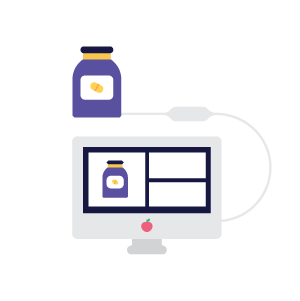The #1 Under-Exploited Opportunity in Nutritional Supplement Marketing

There’s a generations-old marketing truism: “It’s much easier to sell aspirin than vitamins.”
It’s a truism because most humans respond  more urgently to an active headache than to the prospect of proactively avoiding headaches by staying healthy. But that does nothing to minimize the fact that (according to Zion Market Research) over $130B of vitamins and other health supplements are sold globally every year.
more urgently to an active headache than to the prospect of proactively avoiding headaches by staying healthy. But that does nothing to minimize the fact that (according to Zion Market Research) over $130B of vitamins and other health supplements are sold globally every year.
It turns out that a significant portion of people is open and responsive to alternative viewpoints. The key challenge for supplement suppliers is educating such that those people can make an informed choice to embrace their products (or not). So, the vitamin sale is less about appealing to reactively solving an immediate pain, and more about education and a more proactive choice. And since marketing is essentially doing anything that facilitates sales, the challenge of supplement marketing is to transfer understanding from the brain of the supplier to the brain of the prospective customer.
What does this mean in today’s marketing environment?
If you are a marketer these days, it’s easy to get  the idea that “marketing” means “digital”. There are a host of reasons for this, rooted mostly in the fact that digital techniques are comparatively easier to employ than any other option in history. The advantage is that the supplier simply needs to transcribe their knowledge to a digital medium – a website, or a blog, or an ad, or a video, or a podcast – and then get that content in front of a pool of prospective customers. A key disadvantage is that the digital space today is a very crowded place indeed.
the idea that “marketing” means “digital”. There are a host of reasons for this, rooted mostly in the fact that digital techniques are comparatively easier to employ than any other option in history. The advantage is that the supplier simply needs to transcribe their knowledge to a digital medium – a website, or a blog, or an ad, or a video, or a podcast – and then get that content in front of a pool of prospective customers. A key disadvantage is that the digital space today is a very crowded place indeed.
But when it comes to ingestible products, several additional marketing challenges arise that must be solved before a sale will occur. Primary among those challenges is that people don’t want to put anything into their bodies unless they are confident in the product’s safety and benefits in general, and they also don’t want to do so unless they trust the supplier of that product specifically.
Certainly, it is possible to establish safety, benefits, and trust with enough digital contact. But are there other, more effective ways to do so?
 The Person-to-Person Option
The Person-to-Person Option
It is obvious to anyone who (like myself) has marketed dietary supplements that marketing and selling supplements is easier when done in person. When approaching the challenges of establishing safety, benefits, and trust, marketing in person possesses several inherent advantages. The first advantage is that there is a wide spectrum of awareness in prospective users of the benefits of supplementation – ranging from complete ignorance, to high levels of knowledge and skepticism. Until one engages with a prospect, it is difficult to know just what to tell them to add to their preexisting level of knowledge. In digital, such an engagement is virtually impossible, and thus, throwing content out there is a bit of a crap-shoot. But in-person, it is much easier to have a two-way conversation, determine a prospect’s needs and level of subject knowledge, and adjust one’s messaging appropriately so as to communicate benefits and the data and reasoning behind them.
The second advantage to in-person marketing of supplements is the ability to inform of the safety (or possibly risks) associated with a given product. The world of supplementation is a world of biochemistry and biological function – an inherently large and complex area of study. Here again, there is a wide variation in knowledge level of prospective users, ranging from ignorance (and/or fear) up to thorough
 knowledge and comfort with various products. It is also worth noting that given the slippery slope of functional and safety claims, there is an established legal framework (codified most notably in DSHEA, the Dietary Supplement Health and Education Act of 1994) that must be complied with and which specifies what safety is and what can be said (or claimed) to prospective users. By engaging prospective customers with marketers who are well versed in the uses, characteristics, and differentiating factors in your products, as well as the nuances of what can and should be said legally, it is possible to “zero in” on what a prospective user needs to hear about rather than throw the entire kitchen sink at them. This leaves prospects less confused, and more likely to buy.
knowledge and comfort with various products. It is also worth noting that given the slippery slope of functional and safety claims, there is an established legal framework (codified most notably in DSHEA, the Dietary Supplement Health and Education Act of 1994) that must be complied with and which specifies what safety is and what can be said (or claimed) to prospective users. By engaging prospective customers with marketers who are well versed in the uses, characteristics, and differentiating factors in your products, as well as the nuances of what can and should be said legally, it is possible to “zero in” on what a prospective user needs to hear about rather than throw the entire kitchen sink at them. This leaves prospects less confused, and more likely to buy.
The third and possibly largest advantage of marketing supplements in person is the ability to establish trust more quickly. Here, the credibility of the marketer (ambassador) has a major impact on how readily trust can be established. At the high end of the spectrum, a medical doctor can make a recommendation on a course of supplementation (and they often do), and the user will trust that recommendation to a very high degree. Just below doctors, we can see that ambassadors who obviously share a health objective with the prospect (and can speak authoritatively about the product) will also have an inherently high ability to establish trust in the prospect. Think bodybuilders talking about protein or amino supplements, or a speaker who has celiac disease speaking about gluten-free products.
The person-to-person interaction isn’t limited to credentialed experts, however. If your mother or your sister tells you that something is ok, it may not carry the same weight as a recommendation from your doctor, but it’s 10 times better than a Facebook ad. There’s something widely appealing to us about being able to look another human in the eye, and to ask them if it’s a good idea to take this thing.
This is why so many supplements are sold in person. Two major avenues for in-person selling come to mind, the first being multi-level marketing. Here, non-experts do a fine job of assuring their friends, family, and even mere acquaintances that supplements are safe, effective, and that their suppliers can be trusted. (If you doubt this, it might help to know that according to the Nutrition Business Journal, roughly $4.5B of supplements are sold annually via network marketing in the US alone.)
This in-person phenomenon presents an even larger opportunity for retail suppliers. NBJ similarly sizes the US retail supplement industry at $13.5B per year. This figure encompasses both specialty nutritional stores, as well as retail grocery outlets. In both formats, it would make sense that in-person engagement with consumers might benefit a supplier – and it’s clear to anyone who has spent any time in the supplements aisle that there’s plenty of opportunity for an educated ambassador to swoop in and help a dazed shopper to decide on which products will be best for them.
This is where a competent field marketing  force can really make the difference for suppliers. If a shopper encounters a supplier’s friendly and knowledgeable ambassador in the store, there is a much higher likelihood of a purchase going their way. But what about when the ambassador isn’t in the store? As often as they can, an unsure shopper will seek out the nearest (hopefully knowledgeable) human being to ask them what they think – and that human will most often be a member of store staff. And it will be an obvious advantage if that member of staff was trained by none other than that same friendly and knowledgeable ambassador a few days ago.
force can really make the difference for suppliers. If a shopper encounters a supplier’s friendly and knowledgeable ambassador in the store, there is a much higher likelihood of a purchase going their way. But what about when the ambassador isn’t in the store? As often as they can, an unsure shopper will seek out the nearest (hopefully knowledgeable) human being to ask them what they think – and that human will most often be a member of store staff. And it will be an obvious advantage if that member of staff was trained by none other than that same friendly and knowledgeable ambassador a few days ago.
This idea is supported by the data. At Promomash we service the in-store demo and ambassador industry for hundreds of food, beverage, beauty, and supplement suppliers internationally. We provide manufacturers comprehensive understanding of the demo and events process, data to help management optimize their demo programs, and a calculation of the return on their in-person marketing investment. From our insider’s vantage point, we know that:
- demo marketing offers supplement suppliers a tremendous opportunity for increasing brand awareness, and rapid increases in sales and profit – the sheer numbers of demos being done today prove it;
- brands often hesitate to start doing in-store demos (or may even abandon doing them) because they don't know how to do them efficiently; and
- even those manufacturers committed to demo marketing rarely do so as efficiently as they could be.
While demo marketing is a highly profitable activity across all the product categories above, it is particularly effective in the supplement aisle, due to (a) the relatively high prices of supplement products, and (b) the large number of people who are interested in buying them (if only they knew what products and suppliers were safe, effective, and trustworthy).
We also see that this potential has only begun to be exploited. We believe that in the next few years, in-store demo marketing will significantly outpace the overall growth in marketing spend. You’ll see more and more friendly and knowledgeable folks in the supplement aisle, just waiting to be helpful.
And everyone will benefit from that.